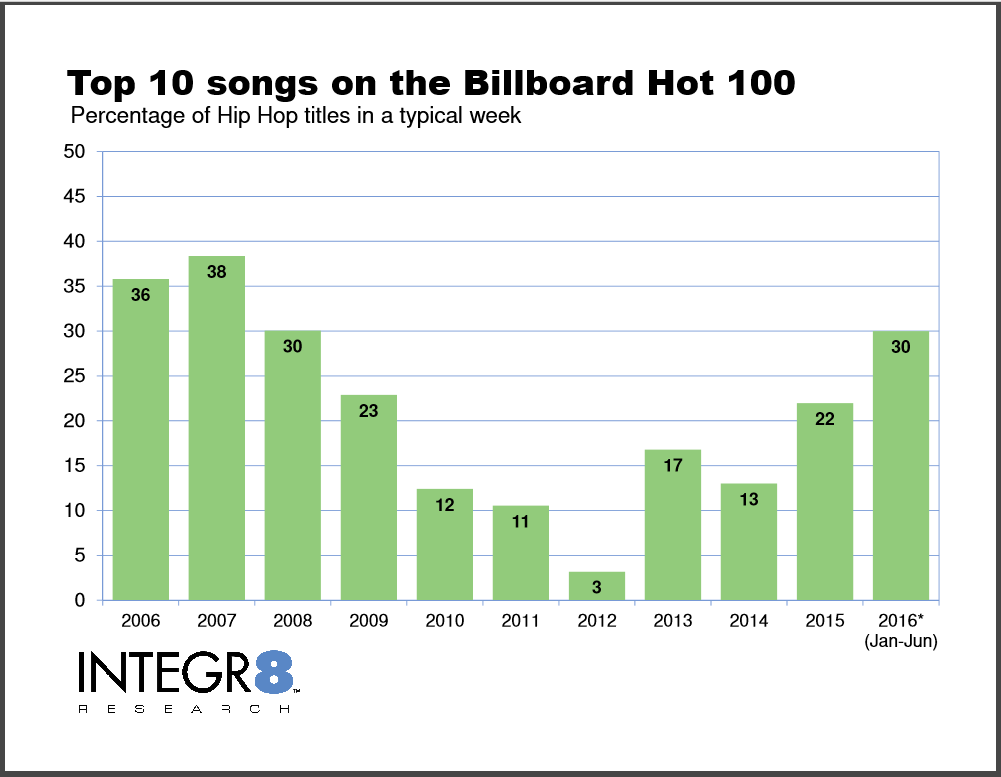In 2012, a flurry of articles began appearing in the music press asking, “Is Hip Hop dead?” Most articles simply bemoaned the lack of authenticity of the genre’s good old days, or complained it was becoming “too white,” but a few articles actually cited data. Did you know not a single African-American artist hit #1 on the Billboard Hot 100 chart in 2012, or that no Hip Hop song reached #1 for almost two years between 2011 and 2013?
For our Integr8 New Music Research clients that target predominantly African-American audiences, Hip Hop continued to test well. However, our Rhythmic CHRs that target Caucasian and Hispanic listeners were frustrated at the lack of Hip Hop hits with crossover appeal among their general market audiences. Crossover Hip Hop, after all, is what made the format different from mainstream CHR in the first place.
Did Hip Hop really die in 2012?
To find out, we examined every song that became a Top 10 hit on the Billboard Hot 100 chart from January 2006 to June 2016. (By examining the Hot 100, we can examine all the ways listeners consume music on a broad nationwide basis, instead of the tightly tailored local radio audiences we track for individual stations in our Integr8 New Music Research.) We then had our team of music experts code each song to determine how many of those Top 10 hits were Hip Hop, both the Pure Hip Hop tracks typically only found on Urban radio by artists such as Lil Wayne, T.I., Jay Z and Future, as well as those Pop Hip Hop songs that usually become Mainstream CHR hits from artists like Drake, Nelly, Flo Rida and Wiz Khalifa.
Here’s what we uncovered:
- In 2007, when Mims “This Is Why I’m Hot”, and “Buy U a Drank” from T-Pain featuring Yung Joc shared the Top 10 with Fergie and Plain White T’s—Hip Hop accounted for 38% of all Top 10 hits in a typical week.
- Fast forward to 2012, when Carly Rae Jepsen’s “Call Me Maybe” and Gotye’s “Somebody That I Used to Know” were inescapable chart-toppers, a scant 3% of Top 10 hits in a typical week were Hip Hop.
No wonder 2012 was the year music critics wrote Hip Hop’s eulogy.
However, as Mark Twain famously quipped, “The reports of my death have been greatly exaggerated.”
- In 2013, Hip Hop titles rebounded to comprise 17% of the Top 10 in a typical week.
- In 2014, Hip Hop’s share of the Hot 100’s Top 10 in a typical week sank slightly to 13%.
- By 2015, Hip Hop rebounded to 22% of the Top 10 in a typical week in 2015. While still well below the genre’s appeal a decade ago, it’s still comparable to 2009 when Hip Hop’s fate was not yet in question.
- So far in 2016, Hip Hop accounts for 30% of the Top 10 in a given week, putting Hip Hop’s share of the biggest hits back to 2008 levels.
However, there are three fundamental differences between Hip Hop’s chart performance before and after 2012. We’ll explore why today’s Hip Hop hits aren’t the same as yesterday’s in our next post.
Figure 1: Percentage of Hip Hop titles in a typical week in the Top 10 on the Billboard Hot 100.

